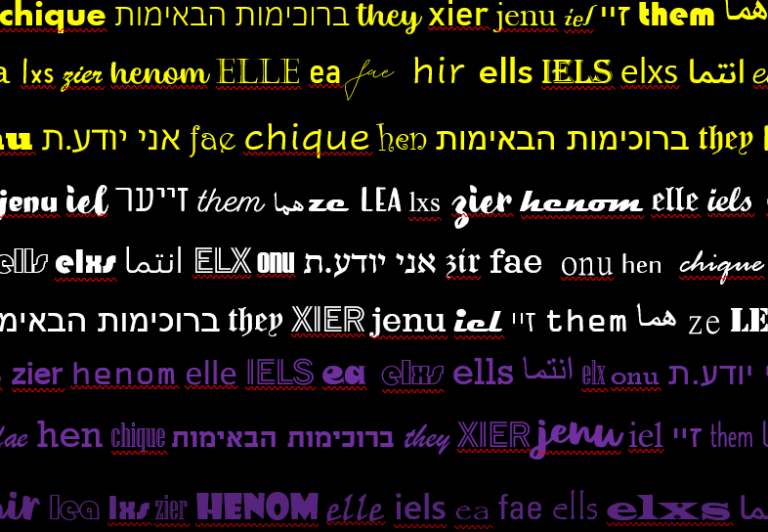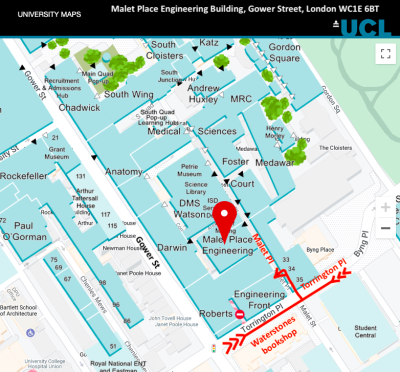Challenging the Binary: Non-Binary, Genderqueer, and Gender-Neutral Language
13 June 2023–15 June 2023, 9:00 am–5:00 pm

The purpose of this three-day conference (13-15 June 2023) is to explore non-binary, gender-inclusive, and gender-non-conforming language cross-linguistically.
Event Information
Open to
- All | UCL staff | UCL students | UCL alumni
Availability
- Yes
Cost
- £50.00
Organiser
-
Lily Kahn
The conference will be held in hybrid format (in person at University College London and online) 13-15 June 2023.
Challenging the Binary Programme (PDF) (or Word) Updated 13/06/23
Challenging the Binary Abstracts (PDF) (or Word)
Growing recognition and understanding of gender-non-conforming, non-binary, queer, and other gender identities have led to shifts in language use and structures. One of the most obvious examples is the increased popularity of declaring one’s gender using gender-neutral and neo-pronouns in languages that traditionally lack such forms of expression, e.g. the English they/them/their and ze/zer/zeir. Expressing non-binary identities in languages with grammatical gender can be challenging and has led to the emergence of new noun and adjective forms, such as the gender-neutral Spanish chique/chiques ‘child/children’ from the older binary forms chico/chicos ‘boy/boys’ and chica/chicas ‘girl/girls’. Similarly, in some languages (e.g. Hebrew, Arabic, Welsh, and French), even verb forms or prepositions can be gendered, which means that the introduction of new gender-neutral forms is starting to change the verbal structures of the languages in question. Likewise, growing numbers of languages are introducing innovative gender-neutral orthographic symbols; for example, in Spanish the letter x has come to be used as an inclusive replacement for masculine and feminine noun and adjective endings in writing. Conversely, speakers of languages without grammatical gender, such as Finnish, have seen other linguistic developments in response to gender diversity, such as the use of English pronouns, gender-neutral names, and new vocabulary to describe the range of gender identities. Another aspect of these societal changes is the spread of new practical ways to enable and support the expression of gender identities in the language classroom (for both teachers and students).
The purpose of this three-day conference is to explore non-binary, gender-inclusive, and gender-non-conforming language cross-linguistically. We welcome contributions on all languages, but are especially interested in minority, endangered, and Indigenous languages.
The registration fees are £50 (regular), £25 (student), and £15 (online). The in-person fees cover the cost of refreshments during breaks and the reception, while the online fee covers admin costs associated with the event.
Location
The Engineering Building on Malet Place is accessed via the first entrance on the left after the metal gates into Malet Place. There are security guards at the gate that will be happy to point you in the right direction.
There is a cafe with coffee, tea, bubble tea, and snacks in the ground floor of the Engineering building.

Accomodation
Following are our suggestions regarding accommodation:
Mid range:
- The Tavistock Hotel, 48-55 Tavistock Square, London WC1H 9EU
- Goodenough Club, 23 Mecklenburgh Square, London WC1N 2AD
- Goodge Street Premier Inn, Brook House, Torrington Place, London WC1E 7HN
- Bedford Hotel, 83-95 Southampton Row, London WX1b 4HD
Budget:
- St Athans Hotel, 20 Tavistock Place London WC1H 9RE
High-end:
- Radisson Blu Edwardian Kenilworth Hotel, 97 Great Russell Street Bloomsbury London, London WC1B 3LB
 Close
Close

